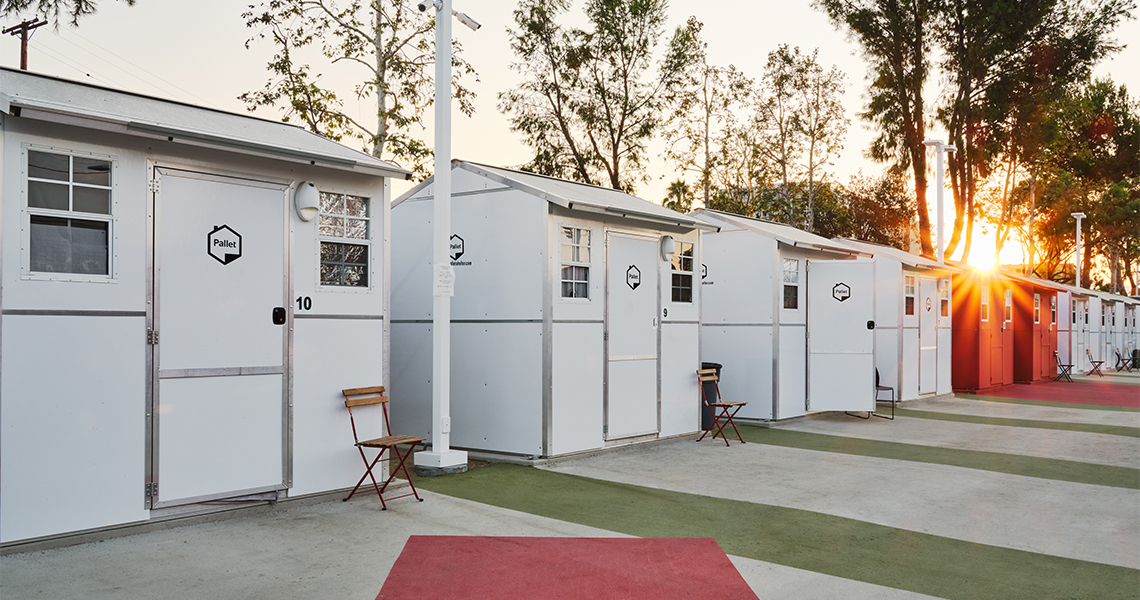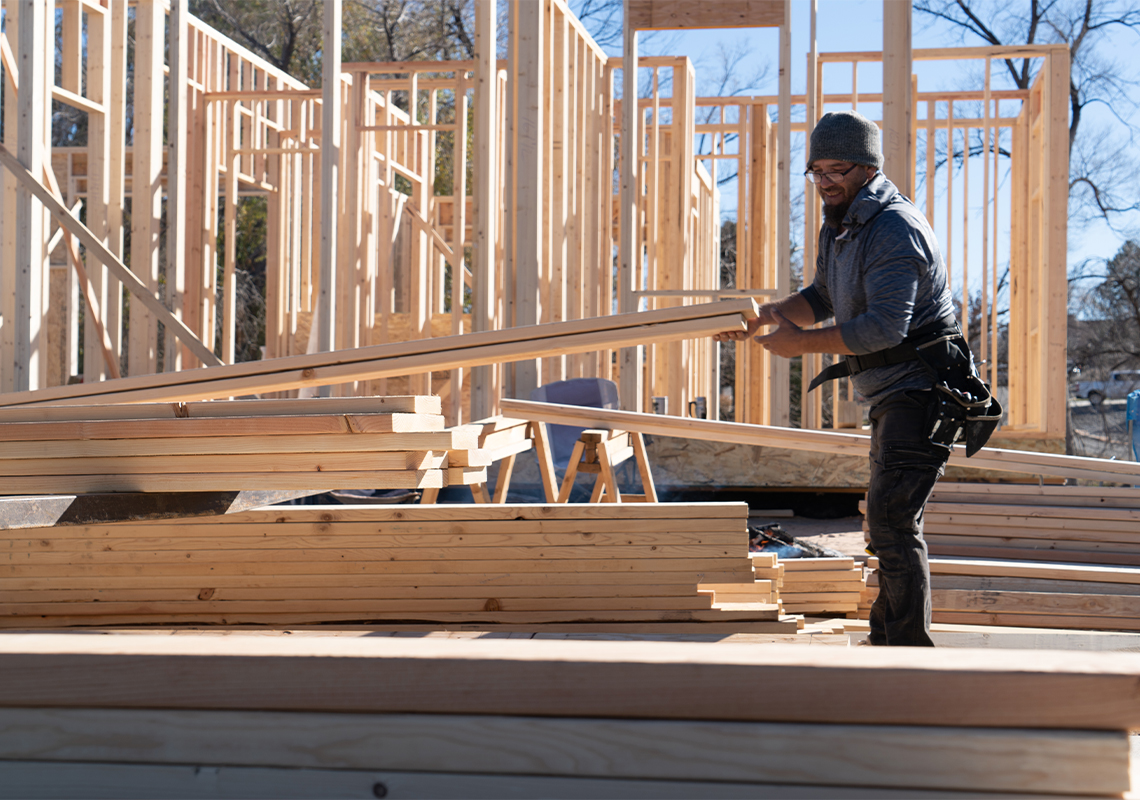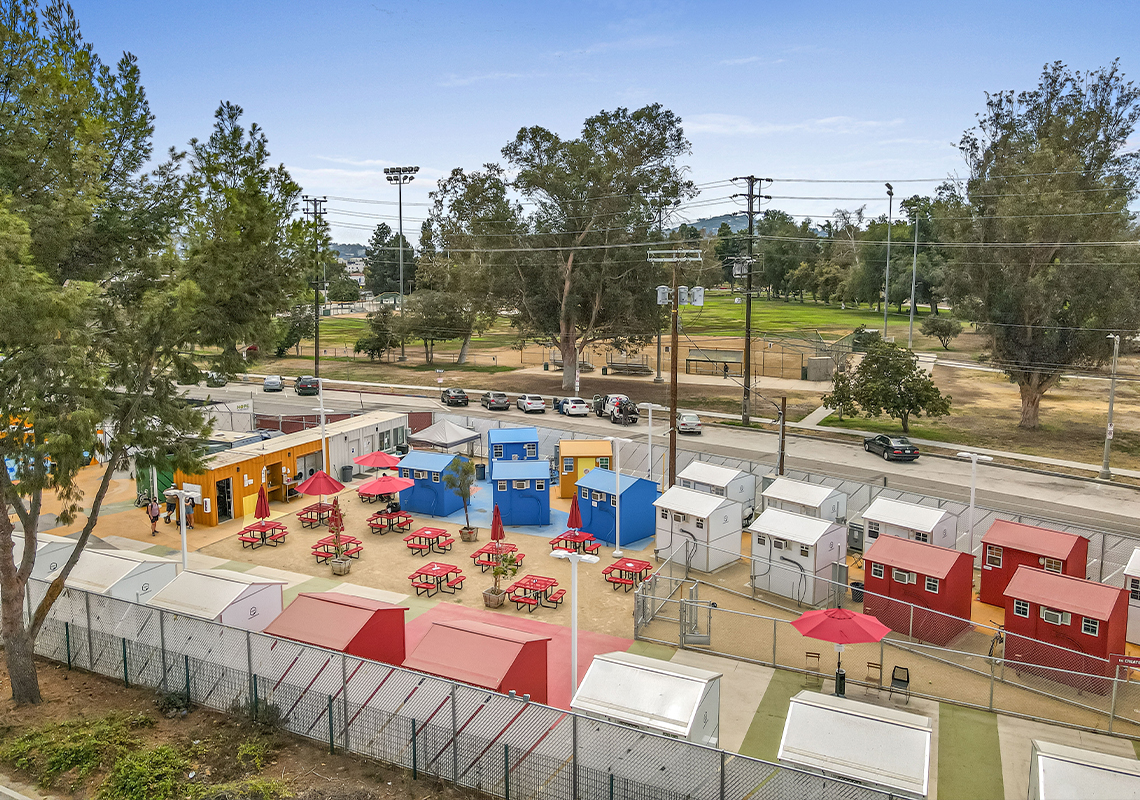By MBAKS Content Strategist James Slone
Everett-based Pallet is helping lift people out of
homelessness one shelter at a time.

Cabins at Chandler Village in Los Angeles
Homelessness is a national
problem. While a lot of
the media focus has been
on California, all major cities
in the U.S. have large homeless
populations, especially where
affordable housing is scarce.
Depending on who’s counting,
King County alone has
between 13,000 and 40,000
unhoused people.
For many individuals, past
run-ins with the justice system and struggles with addiction or
mental health make it difficult
to utilize traditional shelters.
But a temporary shelter that
is clean, safe, and private can
help them attain stability,
access care, and move towards a
permanent home.
That’s where Pallet comes in.
A public benefit corporation
based in Everett, Pallet’s
mission is to create “private and safe spaces for anyone
transitioning from homelessness
to more permanent housing.”
How? By fabricating private
sleeping cabins with lockable
doors that can be easily
assembled anywhere.
Composed of fiberglassreinforced
plastic, foam insulating cores for shelves and
panels, and aluminum framing,
Pallet cabins are less expensive
than traditional shelters and can
be deployed quickly and cheaply
to create rapid-response villages
anywhere in the country.
For Amy King, CEO and founder
of Pallet, the company’s business model is not the end point but
the beginning. “Our ultimate
goal,” she tells me, is “a world
where no one goes unsheltered.”
But she’s quick to add that
others will “have to step in and
innovate to make that happen.”
“People Are the Bottom Line”
Pallet grew out of Square Peg
Construction, a company Amy
founded with her husband Brady
in 2014 to employ formerly
incarcerated and homeless people
in homebuilding. While helping
employees reenter the workforce,
they realized that many struggled
with post-traumatic stress
disorder (PTSD). This made
staying in congregate shelters,
where residents reside together
in a shared space, virtually
impossible.
Years before, the Kings had
explored the possibility of
deploying private shelters for
families displaced by natural
disasters like Hurricane Katrina.
Perhaps, they thought, the
disaster idea could be adapted.
“The real lightbulb moment for
us was when we brought the
original idea to our staff,” says
Amy. “They unanimously agreed
that a community-based model
with private space was the
missing piece” of the housing
puzzle. That led to the shelter
design that, in Amy’s words,
“encourages people to come
inside who would otherwise
reject services.”
Community Focus
Pallet’s model is already bearing
fruit. Since 2019, they’ve
constructed thousands of
sleeping cabins and are looking
to build thousands more.
“We’ve built nearly 100
communities in 50 cities across the U.S.,” says Amy, “with 76
currently operating in 45 cities,
seven in Washington alone.
That’s one in five states!”
Building individual units is just
one part of creating villages. To
be effective, they have to offer
more than just shelter. 24/7
onsite social services and public
amenities—such as laundry and
shower facilities—are essential
to improving the quality of life
for residents transitioning to
permanent housing.
To deliver this, Pallet works
closely with nonprofits and
municipalities across the country.
“Our primary customers are
public entities: cities, counties,
states, and soon, federal
agencies,” Amy tells me. “But
we do sell shelters directly to
nonprofits and faith-based
groups to build the cabins
themselves.”
Working closely with
community-based partners is
essential to success. “We’ve met
hundreds of service providers
across the country that are doing amazing work in their
communities to serve those in
need. And we always defer to
them, since they know what’s
best for their communities.”

Construction for Change volunteers assemble 20 Pallet shelters in Everett
Anywhere, Anytime
Pallet’s villages can be built in
a wide range of locations and
easily moved or dismantled.
Because the villages are only
active for a few months to a
few years, they can be placed
on vacant land before it’s
permanently developed—
making the cost of renting the
land negligible.
Vertical integration makes
Pallet products scalable and
cost-effective, further bringing
down the price of deployment.
Each panel is fabricated in
Pallet’s shop in Everett before
being shipped to the site.
According to Amy, they can
fit 20 to 25 standard shelters,
accessories included, in one
53-foot trailer.
Pallet cabins are built to last for
up to ten years, pretty impressive
for structures that can be built by
two or three people in under an hour. Community rooms
are a little more complicated,
taking one to two days for
assembly, and hygiene facilities
must be connected to onsite
services by licensed plumbers
and electricians.
Depending on the needs of
the customer, the deployment
team can assemble the village
in a matter of days, especially
when partnering with local
organizations like Conservation
Corps or Team Rubicon.
Quality Assured
Before Pallet ships a cabin,
customers are contractually
required to meet five “dignity
standards”: access to services,
hygiene centers, food,
transportation, and security for
resident safety.
I asked Amy about organizations
that can’t meet the requirements.
“We have an in-house Advisory
Services and Government
Affairs team who will assist
them,” she explains. “We also
have a village success manager
who travels around the country
auditing our sites and serving as
a partner to help them succeed
in getting their residents’ needs
addressed.”
“We’ve had the privilege of
meeting hundreds of amazing
service providers and are
quickly learning how to assess
their success. We’re constantly
working with them to identify
and share best practices
and serve as a catalyst for
collaboration and idea sharing.”

Private bathroom
and showers at the Pallet
village at Skagit First Step
Center in Burlington
Prioritizing People
Pallet has had a great run thus
far and continues to grow. But
Amy says there is still much to be
done. “Pallet is not yet profitable
due to very high growth in the
last few years and investment
in our ability to scale to serve as
many communities as possible.”
“A public benefit corporation,
Pallet’s profits are designated
first and foremost to our
mission,” says Amy, “which,
beyond housing people, is
providing living wage jobs to
people that need them most
in the communities in which
we operate.”
Pallet currently has 105 full-time
employees. Many of them
(about 80%) have histories of
homelessness, addiction, and/
or justice system involvement.
To stabilize and help them
break the cycle of poverty, Pallet
offers health insurance, 401(k)
plans, mental health support,
on-the-job and life skills
training, and other support.
This doesn’t just benefit
their employees; it helps the
construction industry as a
whole, which continues to face
a shortage of skilled workers.
“As demand for our product
continues to grow, we plan to
create more production facilities
in cities across the country
that have the highest rates of
homelessness and recidivism
to train the next generation
of [the] manufacturing and
construction workforce.”
Big Problems Require
Many Solutions
Scalability is key to taking on
a problem of such magnitude.
The scale Pallet’s aiming for
is epic. “In five to ten years,”
says Amy, “Pallet will have a
global presence and will offer
products to meet the needs of international communities
displaced by conflict, disaster,
and poverty.”
This is no small order, and Amy
encourages other companies to
take up the challenge. In a recent
interview with LA Currents,
she declared, “We welcome
competition in the space and
want people to come up with
more innovative ideas. We need
more housing; everyone agrees
with that.”
She tells me, “We recognize
that the global housing crisis
is too massive for Pallet alone
to solve and hope to inspire
and collaborate with other
housing innovators to create
housing technology that can
overcome the many challenges
of the regulatory and built
environment.”
Pallet may not be able to take
on homelessness alone, but if
other innovators follow their
path, one day everyone will
have access to a home of their
own—or at least take the first
major step on their way.
Pallet has
been building
villages across
the nation.
Here’s a look
at just a few
of them.
Giving Veterans a Helping Hand. This 110-unit
village opened in the fall of 2021 on the
West Los Angeles Veterans Administration
campus, supported by several major donors,
including former California Governor, Arnold
Schwarzenegger. The 110 veterans the site can
now support will receive direct VA health care
services while transitioning to permanent housing.
Ten Villages in LA. Pallet and Los Angeles
Conservation Corps erected ten shelter villages
with a combined 1,282 units on unused plots of
land. In partnership with local operators, the City
of Los Angeles ensures provision of onsite services
at all villages, including meals and showers, job
training referral, and case management and mental
health services."
Keeping Warm in Boston. This 18-cabin
village, constructed in 2021 at Lemuel
Shattuck Hospital in Boston and overseen
by the Commonwealth Care Alliance,
provides warmth and shelter from harsh
winter conditions plus behavioral health
care, long-term housing search support,
medication-assisted treatment, security, and
several quality-of-life amenities.